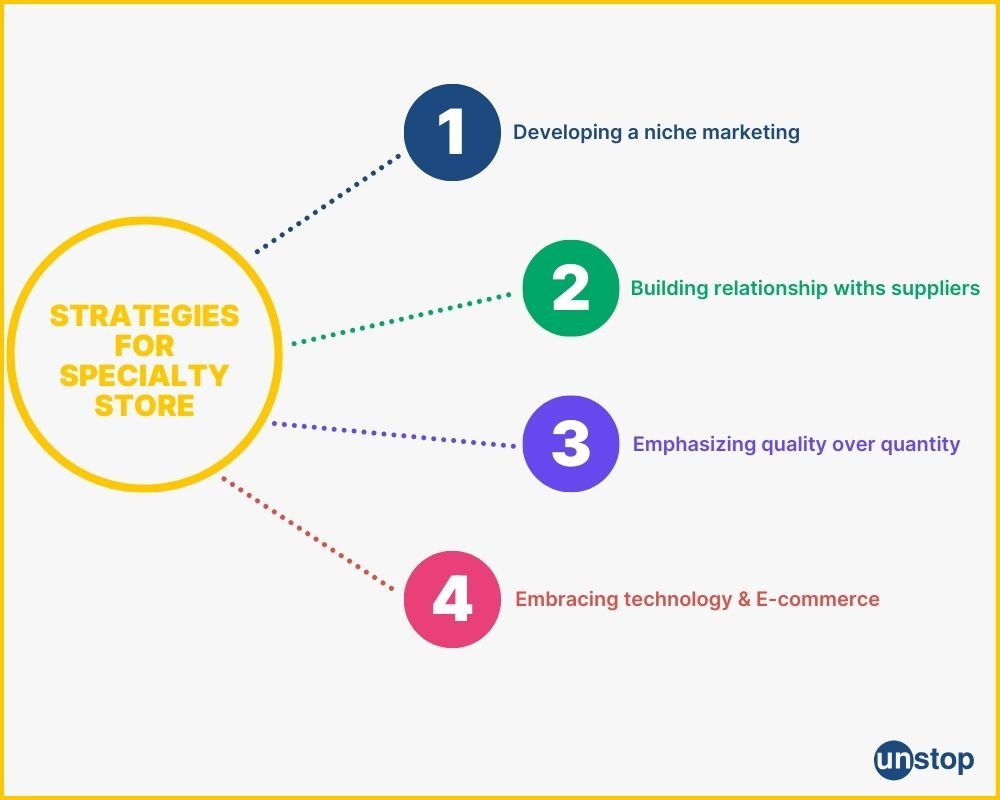- Defining Specialty Store Concept
- Advantages & Challenges Of Specialty Store
- Significance Of Branding In Specialty Stores
- Assortment & Expertise In Specialty Store
- Business Strategies For Specialty Store
- Navigating Market Dynamics In Specialty Retail
- Frequently Asked Questions (FAQs)
Specialty Store | Meaning, Strategies & Examples Explained

Specialty stores offer a unique shopping experience, catering to specific customer needs and preferences. These successful retail establishments focus on providing expert knowledge and personalized service, setting them apart from general stores or department stores.
The specialized nature of these stores allows them to curate a wide selection of products that meet the specific requirements and tastes of their target audience. Whether it's finding the perfect piece of furniture for a home or selecting high-quality pet supplies, specialty stores are dedicated to delivering exceptional customer experiences.
Meaning Of Specialty Store & Concept
A specialty store is a retail establishment whose primary focus is on a particular product category or niche market. These stores set themselves apart by offering a strategically curated selection of products that cater to specific customer needs and preferences.
Specialization In Product Category Or Niche Market
Specialty stores are known for their expertise in a particular product category or serving a niche market. They concentrate on offering a focused range of products rather than trying to cater to every possible need.
For example, there are specialty stores dedicated solely to selling athletic shoes, gourmet chocolates, or vintage vinyl records.

By specializing in one area, these stores can provide an extensive variety of high-quality products within their chosen domain.
Curated Selection Of Products
One key aspect that distinguishes specialty stores from other retailers is their emphasis on curating their product offerings. Instead of overwhelming customers with an abundance of choices, these stores carefully select items that align with their target audience's tastes and preferences.
This curation process ensures that customers can find unique and high-quality products tailored specifically to their needs. By focusing on quality over quantity, specialty stores offer an environment where customers can discover new and exciting items without feeling overwhelmed by endless options.
For instance, a specialty bookstore might feature handpicked titles across various genres, providing readers with an exceptional reading experience.
Destination Spots For Customers
Specialty stores aspire to be more than just places where customers buy products; they aim to become destination spots for individuals seeking specific items or experiences. These establishments prioritize creating an inviting atmosphere that appeals to their target demographic.
For example, imagine walking into a specialty tea shop adorned with elegant decor and soothing music playing in the background—a place where tea enthusiasts can find a variety of flavors and learn about the art of brewing tea from knowledgeable staff members.
By cultivating this sense of uniqueness and expertise, specialty stores foster loyal customer bases who appreciate the personalized service and the opportunity to engage with like-minded individuals who share their interests.
Advantages & Challenges Of Specialty Store
Specialty stores offer unique advantages and face specific challenges in the retail industry.
Advantages
Specialty stores offer unique advantages that can help them thrive in the retail industry. Let us study some of the advantages of specialty stores:
Build Strong Customer Loyalty
One significant advantage is the ability to build strong customer loyalty. By focusing on a specific niche, specialty stores endeavor to meet the specific needs and preferences of their target audience.
This personalized approach often leads to repeat customers who appreciate the specialized products and services offered by these stores.
Establish Brand Recognition
Another advantage of specialty retail is the opportunity to establish brand recognition. By specializing in a particular category or product, these stores can become known as experts in their field.
This expertise helps build trust among consumers, making them more likely to choose a specialty store over larger retailers for their specific needs.
Challenges
However, along with the advantages stated above, there are also challenges that specialty stores face. Let us study some of the challenges in managing specialty stores:
Limited Target Audience
One challenge is the limited target audience. Unlike larger retailers that cater to a broad range of customers, specialty stores have a narrower focus.
While this allows them to serve a dedicated customer base, it also means they may have fewer potential customers overall.
Competition From Larger Retailers
Specialty retailers often face competition from larger retailers. When similar products or services are offered at lower prices by big retailers due to economies of scale, it becomes a challenge for specialty retailers.
This competition can make it challenging for specialty stores to attract and retain customers.
Inventory Management
To succeed in the world of specialty retail, careful inventory management is essential. Since these stores typically carry a limited selection of products within their niche, it's essential to ensure that inventory levels are optimized.
Overstocking can lead to financial losses if items do not sell well, while understocking may result in missed sales opportunities.
Niche Marketing Strategies
Furthermore, niche marketing strategies are vital for specialty retailers. These strategies involve targeting specific customer segments through tailored advertising campaigns and promotions.
By understanding their target audience's needs and preferences, specialty stores can create effective marketing messages that resonate with potential customers.
Significance Of Branding In Specialty Stores
The role of branding is vital for the success of specialty stores. It helps these stores differentiate themselves from their competitors by creating a lasting impression in the minds of their customers.
Let's explore why branding is so significant for specialty stores:
Strong Branding Sets Specialty Stores Apart
One of the key advantages of strong branding is that it helps specialty stores stand out from the crowd. In a market saturated with various retail options, having a distinct brand identity can make all the difference.
A well-defined brand image allows specialty stores to communicate their unique value proposition to customers effectively. Whether it's through an eye-catching logo, memorable tagline, or consistent visual elements, strong branding ensures that specialty stores are easily recognizable and memorable.
Branding Fosters Customer Loyalty
Building emotional connections with customers is vital for any business, and this holds especially true for specialty stores. By establishing a strong brand presence, these stores can cultivate loyalty among their customer base.
Customers who feel connected to a brand on an emotional level are more likely to return and become repeat buyers. This loyalty not only drives sales but also encourages positive word-of-mouth referrals, which can further expand the customer base.
Enhanced Perceived Value
A well-established brand enhances the perceived value of products offered by specialty stores. When customers associate a particular brand with quality, reliability, or uniqueness, they are willing to pay a premium price for those products.
This means that even if similar items are available elsewhere at lower prices, customers will choose to shop at specialty stores because they trust the brand's reputation and believe they are getting superior products or services.
Building Trust & Credibility
Trust and credibility among consumers are built through branding. A reputable brand signifies consistency in delivering on promises made to customers regarding product quality, customer service, and overall shopping experience.
By consistently meeting or exceeding customer expectations, specialty stores can establish themselves as trustworthy and reliable sources.
This trust is crucial in an era where consumers have access to numerous options and are more discerning about where they spend their money.
Creating A Memorable Experience
Effective branding allows specialty stores to create a memorable shopping experience for their customers. From the store's ambiance and layout to the packaging of products, every aspect of the brand's presence contributes to shaping the overall customer experience.
By paying attention to these details and ensuring consistency, specialty stores leave a lasting impression on customers, making them more likely to return in the future.
Assortment & Expertise In Specialty Store
Specialty stores are known for their exceptional product assortment and expertise in specific product categories.
Curated & Deep Assortment Offer
Specialty stores offer a curated and deep assortment of products unlike general retailers that carry a broad range of items, specialty stores focus on a niche market. This means that customers are more likely to find specialized items that may not be available at larger, more generalized retailers.
As a result, customers can trust that they are purchasing high-quality merchandise from reputable brands when shopping at these establishments.
Trained & Knowledgeable Staff
In addition to their extensive product offerings, specialty stores also pride themselves on their knowledgeable staff. The expert product advisors employed by these retailers have in-depth knowledge about the specific products they sell.

They undergo training and stay up-to-date with the latest developments in their respective fields. This expertise plays a crucial role in providing exceptional customer service.
Business Strategies For Specialty Store
To ensure the success of a specialty store, it is essential to implement effective business strategies.
Let us study some of the important business strategies for specialty stores:

Developing A Niche Marketing Strategy
One of the key factors in the success of a specialty store is having a well-defined niche marketing strategy. A niche marketing strategy allows specialty stores to tailor their offerings to a specific target audience.
This involves identifying and targeting a specific segment of customers with unique needs or preferences. By focusing on catering to this niche market, specialty stores can differentiate themselves from larger retailers and attract customers looking for specialized products or services.
For example, if a store specializes in organic skincare products, it can focus on promoting the benefits of natural ingredients and eco-friendly packaging to attract environmentally conscious consumers.
Building Relationships With Suppliers
Another important aspect of running a successful specialty store is establishing strong relationships with suppliers. Building relationships with suppliers opens up opportunities for collaboration and joint promotions.
By cultivating these connections, specialty stores can secure exclusive product offerings that are not readily available in other retail outlets. Customers can benefit from this exclusivity when seeking unique and hard-to-find items.
For instance, if a specialty store sells handmade jewelry sourced directly from local artisans, they could partner with those artisans for special events or limited-edition collections.
Such collaborations can generate excitement among customers and create additional buzz around the store.
Emphasizing Quality Over Quantity
Specialty stores often thrive by offering high-quality products that cater to discerning customers who prioritize craftsmanship and uniqueness. Emphasizing quality over quantity sets them apart from mass-market retailers that focus on volume sales.
By curating carefully selected merchandise that meets stringent quality standards, specialty stores can build trust with their customer base. Customers appreciate the attention to detail and expertise demonstrated by these establishments.
For example, a specialty store specializing in gourmet chocolates might source its products from renowned chocolatiers renowned for their exceptional flavors.
Embracing Technology & E-Commerce
Furthermore, embracing technology and e-commerce can help specialty stores expand their reach beyond physical locations. Online presence and convenient shopping options can help these stores attract customers who may not have access to their physical stores or prefer to shop from home.
Navigating Market Dynamics In Specialty Retail
Monitoring industry trends and consumer demands is imperative for specialty retailers to stay relevant in the market. By keeping a close eye on these factors, retailers can determine their product offerings, pricing strategies, and overall business direction.
Exploring New Product Offerings
Adapting quickly to changing market dynamics is key to ensuring long-term success in the specialty retail sector. As consumer preferences evolve and new competitors emerge, retailers need to be agile and responsive.
This means being open to exploring new product categories or adjusting existing offerings based on customer feedback and market trends.
Collaboration With Other Specialty Stores
Collaboration with other specialty stores or complementary businesses can create mutually beneficial opportunities for all parties involved. By partnering with other retailers in the niche market, retailers can leverage each other's strengths and resources.
Such partnerships not only enhance the shopping experience for consumers but also help retailers expand their customer base through shared marketing efforts.
For example, a clothing boutique may collaborate with a local jewelry store to offer bundled discounts or cross-promote each other's products.
Constantly Monitoring Competitors
In addition to monitoring industry trends and collaborating with others, specialty retailers need to keep a close eye on their competitors. The knowledge of what other market players are doing can provide valuable insight into emerging trends or potential gaps in the market.
Regular Pricing Analyses
Price is another critical factor that specialty retailers must consider when navigating market dynamics. While offering high-quality products often comes at a higher price point, retailers need to find the right balance between quality and affordability.
Conducting regular pricing analyses helps ensure that prices remain competitive while still allowing for sustainable profit margins.
Conclusion
In conclusion, specialty stores play a crucial role in the retail landscape by meeting diverse customer needs and offering a distinct shopping experience. Despite challenges, these stores have the potential for long-term success by adapting to market dynamics and embracing innovative strategies.
By staying true to their niche, providing personalized service, and curating unique assortments, specialty stores can continue to thrive in an ever-changing retail environment.
Frequently Asked Questions (FAQs)
1. What is a specialty store?
A specialty store is a retail establishment with a focus on a particular category of products or serving a particular niche market. These stores offer a curated selection of merchandise and provide expert knowledge and personalized service to customers.
2. What are the advantages of shopping at specialty stores?
Shopping at specialty stores offers several advantages, including access to specialized expertise, a wide range of high-quality products, personalized customer service, and an immersive shopping experience tailored to specific interests.
Specialty stores often carry unique or hard-to-find items that may not be available in larger general retailers.
3. How does branding impact specialty stores?
The role of branding is vital for the success of specialty stores. A strong brand identity helps differentiate these stores from competitors, ensuring trust and creating an emotional connection with customers.
Effective branding can also convey the store's values, expertise, and unique offerings, attracting loyal customers who align with the brand's image.
4. How do specialty stores enhance the shopping experience?
Specialty stores enhance the shopping experience by focusing on providing exceptional customer service, expert product knowledge, and personalized recommendations. They create an inviting atmosphere that immerses customers in their niche market or product category.
This attention to detail ensures that shoppers have an enjoyable and fulfilling experience while exploring their specific interests.
5. What strategies can specialty stores use for success?
Successful specialty stores employ various strategies, such as carefully selecting their target market, offering a well-curated product assortment tailored to customer preferences, and maintaining strong vendor relationships for consistent inventory supply.
Also, it invests in staff training and development to ensure expert knowledge, leveraging digital marketing channels to reach potential customers effectively, and continuously adapting to changing market dynamics.
Suggested reads:
Alekhya Chakrabarty is a father, a doodler, a trivia buff, a sports fanatic and a lifelong student of marketing. Alekhya is the VP of Marketing & Growth at Unstop, the engagement and hiring platform which connects students and graduates with opportunities. He has over a decade and a half of experience in driving revenue and building brands with the likes of Nestle, HUL and ITC. He is an alumnus of IMT Ghaziabad and in his last stint he was leading the marketing function at Sunstone, a higher education startup. Alekhya has been recognised as a ‘Top Voice’ on LinkedIn for Digital Marketing & Brand Management. He runs a marketing podcast titled East India Marketing Company to drive conversations around growth, content, culture and commerce.
Login to continue reading
And access exclusive content, personalized recommendations, and career-boosting opportunities.
Subscribe
to our newsletter















Comments
Add comment